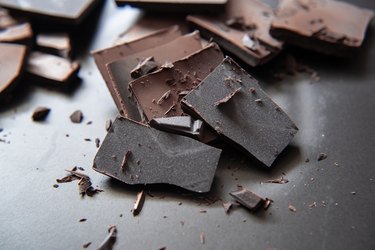
Having diarrhea is miserable, but treating it doesn't always have to be. Why? Because dark chocolate may ease diarrhea symptoms. Yes, you read that right. Your candy stash may actually be your next remedy for loose bowel movements.
Is Chocolate Good for Diarrhea?
Video of the Day
"Dark chocolate has been found to help with diarrhea," says Elena Ivanina, DO, a gastroenterologist with Lenox Hill Hospital, part of Northwell Health, in New York City. In fact, she says, the use of cocoa as a diarrhea treatment dates back to ancient European and South American cultures.
Video of the Day
"Cocoa contains flavonoids, natural plant-based compounds that have been found to have antioxidant properties," Dr. Ivanina explains. "They have also been found to block a protein that regulates fluid secretion in the gut," which can improve diarrhea.
"Dark chocolate is especially effective as it is highest in flavonoids," she says.
Other Foods to Eat When You Have Diarrhea
Chocolate isn't the only food that can help, Dr. Ivanina says.
If your diarrhea comes on suddenly and is likely due to food poisoning, "it's best to scale back to broth and crackers," she says. "When you reintroduce foods, start with the BRAT diet — bananas, rice, applesauce and toast."
The BRAT diet gives your digestive system a chance to rest, which reduces the frequency of bowel movements, according to the International Foundation for Gastrointestinal Disorders (IFFGD).
The IFFGD lists other foods that might help calm your digestive tract or replace lost sodium and potassium, such as:
- Sports drinks or rehydration drinks
- Potatoes (boiled or mashed)
- Yogurt (if you can tolerate lactose)
- Rice
- Noodles
- Smooth peanut butter (in small amounts)
- White bread
It's also helpful to have your meals and fluids separately. When you eat and drink at the same time, it can stimulate your bowels to move faster, according to the IFFGD.
Related Reading
Foods to Avoid
On the other hand, there are plenty of foods that can contribute to diarrhea, too.
The IFFGD recommends trying to figure out what foods or fluids cause your digestive symptoms. Some common culprits include:
- Lactose: For a lot of people, milk or products made with milk can be a problem because of lactose, a protein found in milk. "Around 65 percent of the world's population has a decreased ability to digest lactose after infancy," Dr. Ivanina says. If you're one of the many people with lactose intolerance, a lactose-free diet may keep your diarrhea symptoms at bay. "This includes staying away from cheese, milk and ice cream," Dr. Ivanina says.
- Gluten: Another possible cause of chronic diarrhea in people who have celiac disease or a non-celiac gluten sensitivity is gluten, a protein found in wheat. Dr. Ivanina says removing gluten from the diet can improve diarrhea in people with those conditions.
- Fatty foods: If your snacks and meals contain a lot of fat or you love fried foods, your bowels may have to kick into overdrive and secrete more fluids to digest these foods, according to Harvard Health Publishing.
- Sugar: Natural sugars such as fructose, found in fruit and fruit juices, can worsen diarrhea symptoms. The same is also true for dried fruits like raisins, dates and prunes, according to the IFFGD.
- Fake sugars: Some artificial sweeteners found in sugar-free gum, candy and medications don't get absorbed properly in the gut and can lead to diarrhea, Dr. Ivanina says. The most likely offenders are sweeteners that end in "ol." These include sorbitol, mannitol and xylitol, which can have a laxative effect, according to the IFFGD.
- Caffeine: Your morning cup of java may be giving your digestive system a bit too much of a jolt, according to Harvard Health Publishing.
Tip
The foods that can affect the gut vary from person to person, according to the IFFGD, so you may need to experiment with some foods, taking them out of your diet and then gradually bringing them back to see if they're behind your symptoms.
The same goes for foods that might help ease your diarrhea, too. And if you decide to try chocolate, remember to pick a plain dark chocolate and check the label for other ingredients.
Is this an emergency? If you are experiencing serious medical symptoms, please see the National Library of Medicine’s list of signs you need emergency medical attention or call 911.